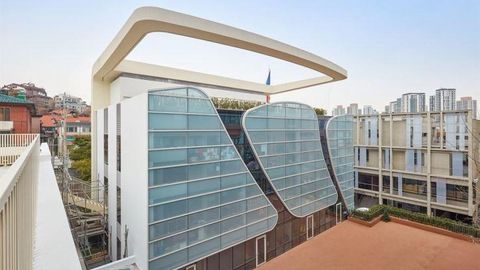COVID-19 • Membres
Operations of the French School of Seoul amidst relaxation of social distancing

Interview of Bruno Hirm-Martin, Headmaster of the Lycée Français de Séoul (LFS)
With the relaxation of social distancing, what is your plan on the schooling of students while preventing the spread of the virus?
As per Ministry of Education of Korea’s guidelines, Lycée Français de Séoul (hereafter LFS) has set out a roadmap to progressively welcome our students back to school. Starting last Wednesday, 20th May, we began with our Terminale (grade 12) students back at school. With various rollout scenarios and delays, we were finally very happy to see our students face-to-face (albeit masks).
Of course, while the situation has improved, we are implementing health measures to ensure everyone’s safety. Our goal, from the very beginning, has been and is, to balance our two priorities: continuity of learning for our students and keeping everyone safe. This would indicate a somewhat different educational conditions will have to be applied: everyone will follow our 6 health rules and 7 sanitary principles, including mandatory mask wearing, mandatory temperature checks, keeping safe distance inside classes, no sharing of personal items, and so on. It would also imply dividing the classes in certain cases to avoid clustering of students at one place.
As this is a continued period of transition, we simultaneously continue to hold distance learning classes to our students, as we have done so from the beginning of this crisis. It is definitely not an easy task, but I believe that LFS community is capable of adapting to the ‘new normality.’
Before the relaxation, did you put in place classes at a distance?
Yes. As aforementioned above, ensuring our students’ learning has been and is a key priority for us, so from the very beginning, we have implemented what we call CDL (Continuity through Distance Learning) system in place. As a common framework for all students, CDL recognized that distance learning is different from a physical classroom, and so it was continuously adapted and evolved per grade, per age, per language, and so on.
The CDL system maintained a regular annual learning objectives, while developing new competencies for the students. We adapted the number of online sessions and its effects on children between the learning needs and implications of screen time, to have a ‘hybrid system’ of both synchronous and asynchronous activities.
This is not to say it was not challenging as it required strong dedication and commitment from everyone, from teachers, students, and to parents. As an unprecedented situation, every benchmark a regular school had, was turned upside down. A weekly meeting was held to receive parents’ feedback and adapt and evolve accordingly. We had to adapt more for the Kindergarten and non-French-speaking families, who naturally faced challenges in caretaking issues and maintaining the children’s French level. However, in the end, we met this extraordinary challenge as a community and make us stronger and more adaptable going forward.




